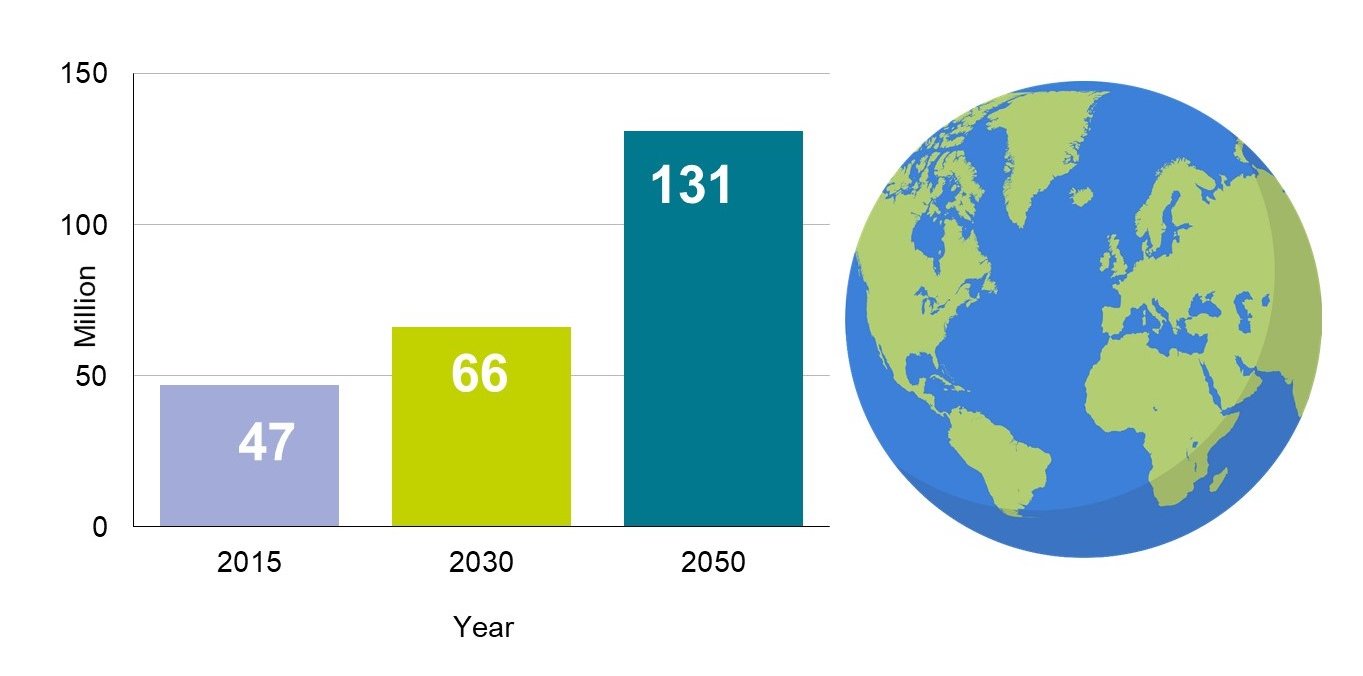Outline of dementia
Here you can expand your knowledge about dementia and thus better support those affected and their relatives.
What is dementia?
Dementia is not a disease but a pattern of symptoms (the medical term is „syndrome“) that can be the result of many causes, including diseases of the brain where nerve cells are gradually lost (neurodegenerations), infections, inflammations, head trauma, tumours and others. The symptoms of dementia refer to cognitive ability, performance on activities of daily living, behaviour, emotional state and social conduct, and physical functioning. The pattern of symptoms shows a broad variation, depending on which parts of the brain are most severely affected by the underlying cause.
Dementia is a global health problem
Dementia is a rapidly growing societal and public health challenge, and it is almost impossible to find someone, who has not been in touch with dementia, at least through friends or family. Worldwide, approximately 47 million people were living with dementia in 2015. Due to the increase in life expectancy this number is expected to increase to 66 million by 2030 and to 131 million in 2050.

Dementia has a profound impact on the person and the family
Dementia has a huge impact on the entire person in terms of personal identity and self-esteem. It also changes the roles and relationships within the family and in wider social networks. The gradually evolving symptoms ultimately lead to increasing disability.
Therefore, dementia has a profound effect on the individual’s quality of life. However, the quality of life in people with dementia is not determined solely by the cognitive impairment that results from the pathological process. At the early stage, it depends to a great extent on autonomy, continuation of individual lifestyle, attainment of personally important goals, meaningful activities and participation in life; at the moderate stage on safety, appreciation and social connectedness; and at the severe stage on comfort, dignity and emphatic relationships. Thus, factors in the environment can be supportive and act in a compensatory way. Importantly, these factors are potentially modifiable.
Many professions can contribute to improving the quality of life of people with dementia and their carers
The quality of life of people with dementia can be improved
The objectives of the dementia strategy focus on supporting people with dementia-related impairments, recognizing their resources and abilities, as well as their participation in public life.
Dementia affects not only thinking and daily life, but also personal identity and self-esteem. It also changes relationships with family and friends. Symptoms worsen over time, leading to increasing impairment.
The main goal of dementia treatment is to maintain quality of life as much as possible. This means supporting remaining functions and compensating for lost abilities. Independence should be promoted as much as possible. Interprofessional cooperation plays a key role in this.
Jane struggled with managing the everyday care for herself and the household, she was unsure about whether she took her pills, whether she picked out the mail or how to use the new washing machine. A social worker recommended her assistive technologies with reminders and notes which helped her to better organise her day.
Diana observed problems with word finding in her husband. Based on an advice from occupational therapist she found materials for cognitive training at the memory clinic and engaged with him in sessions of training when having conversations on different topics.
Daniel felt anxious and nervous during the day and he was not sure about the reason. Sessions of playing piano together with a volunteer helped him to calm down and feel more peaceful, even without medication.
References
- Alzheimer Europe: Dementia in Europe Yearbook 2019. Estimating the prevalence of dementia in Europe. Luxembourg: Alzheimer Europe 2019
- Bayerisches Staatsministerium für Gesundheit und Pflege: Die Bayerische Demenz-Strategie. München 2016
- European Commission: The 2015 Ageing Report. Economic and budgetary projections for the 28 EU Member States (2013-2060). Brussels, European Commission 2015
- Gál Z, Lux G, Illés I. Danube Region – Analysis and long-term development trends of the macro-region. Pécs, Institute for Regional Studies, Research Centre for Economic and Regional Studies, Hungarian Academy of Sciences 2013
- Livingston G, Sommerlad A, Orgeta V et al.: Dementia prevention, intervention, and care: 2020 report of the Lancet Commission. Lancet 396: 413-446, 2020
- Poulos CJ, Bayer A, Beaupre L, et al. A comprehensive approach to reablement in dementia. Alzheimers Dement 3: 450-458, 2017
- Siyam A, Poz MRD eds. Migration of Health Workers: WHO Code of Practice and the Global Economic Crisis. Geneva: World Health Organization 2014
- Waldemar G, Dubois B, Emre M, et al. Recommendations for the diagnosis and management of Alzheimer’s disease and other disorders associated with dementia: EFNS guideline. Eur J Neurol 14: e1-26, 2007
- World Health Organization: International Classification of Functioning, Disability and Health: ICF. Geneva, World Health Organization 2001
- Wu Y-T, Beiser AS, Breteler MMB et al.: The changing prevalence and incidence of dementia over time – current evidence. Nat Rev Neurol 13: 327-339, 2017
